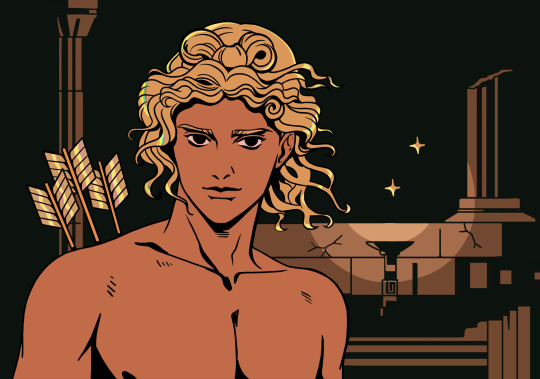Note
What are Apollo's roles as a chthonic deity?
Chthonic deities are the ones that live underworld, or beneath the earth, so Apollo is technically not a chthonic deity. But if you meant to ask for Apollo’s association with death, then there are some. Though, I think the prominent one would be Soranus, the Roman underworld deity, being replaced by Apollo and His cults (I’ll talk about that in the end since it’s explanation might a bit lengthy).
> Apollo is the God of tombs/cemeteries. He guards the souls in the tomb till the body decays and soul can be separated. Hermes is the god who conducts the souls to underworld, but Apollo separates the soul from the flesh. The Ionian tombs have inscriptions asking Apollo to guard the dead bodies and purify their souls.
> Apollo is the God of disease, and that’s his deadly side. He brings death to old and young alike (especially to the young boys). I know any God can bring death to a mortal if They wished, but it was under immediate care of Apollo and Artemis, and They were famously called as bringers of sudden deaths.
> Apollo is especially concerned with dead bodies and their proper burial. This can also be seen when He scolds the other Gods during Trojan war for letting Achilles drag Hector’s dead body. Apollo also protects the dead body by His magic. He is also the one to retrieve the dead body Sarpedon (a son of Zeus) from the battlefield.
> Apollo’s connection with decaying of dead bodies can also be taken from Apollo’s punishment to Python. Python means “rotter”, and the first ever punishment given by Apollo is rotting. His epithet, Pythios, also derives it’s origin from this feat of His.
> The cycle of life and death is a part of Apollo’s nature. His visit to Hyperborea brings winter to the world (and was considered as His “annual death” in Delphi.) He brought death to everything (vegetation especially)with His departure. With His return, new life would be generated. Through the summer and winter cycle He caused, Apollo was both the bringer of life and death.
> Apollo has “consumed” some Gods. I mean, Python was considered as an oracular deity so Apollo basically killed a deity and established His own cult there. And Python wasn’t the only one. Apollo also replaced Paean, an early Greek deity of healing (Paean is now only an epithet of Apollo). Hyacinthus was a pre-hellenic God as well, whose cults were consumed by cults of Apollo, or rather, both were merged and considered as one God - Apollo Hyacinthus. And the most interesting one - Soranus, a Roman underworld deity, was also subsumed by Apollo (Here He is called Apollo Soranus). Hence Apollo basically has taken over the chthonic responsibilities of the former deity - death and purification.
Keep reading
1K notes
·
View notes
Text

Apollo at Night Collection 🏹 shop link
Three of my illustrations printed on 5 x 7 glossy photo paper. All prints are enclosed in a clear archival sleeve with backing to ensure safe arrival to you. Use code: PRINTS for 10% off!

If you are interested in a larger size please let me know and I'll see if I can arrange something. I've just started adding prints to my shop and plan to add more size variations in the future.
58 notes
·
View notes
Note
i’m trying to do more research as i’ve recently started working with apollo, is there any books or further places of research i could us to look further?
khaire anon! thank you for this ask! as always i'm no expert, and this is just my humble opinion.
apollo is quite the complicated god with a long history of worship. i learn something new about him every day, honestly. if you’re looking for basics to research on him, though, here are my suggestions:
-homeric hymns to apollo (hymn 3 and 21). especially hymn 3, it’s a long one, but it covers his birth and the establishment of his temple in delphi. it’s massive to his historical worship and is directly where some of his epithets come from. two that come to mind are dephinius (of the dolphins) and pythian (rotten; apollo takes this name to establish his supremacy OVER the pytho dragon). these hymns are available here or here. the first link is the evelyn white translation to hymn 3 and includes a link to hymn 21, the second is rodney merrill’s translation of hymn 3. i have no preference, as i like to read multiple translations and look for commonalities and differences, but those two i’m fond of.
-check out some of his cult worship. i highly suggest you look into his worship in delphi as your first place, as it’s where his most famous oracle was located, which you can check out here for a brief synopsis to get you started. that being said, he was worshipped all throughout greece and in other areas like turkey, italy and france, so if that interests you, do some research on those topics.
-dig deep into some of his epithets. there’s paean, healer. interestingly, there’s even a specific kind of song named a paean as well. these two (1 2 turn cc on for link 2 for translation) to apollon are some of my favorites. there’s phoebus, shining, his chief epithet. smintheos, lord of mice. musagetes, king of the muses. lykean, of the wolves/of lycia. alexikakos, averter of evil. all of these have so much history behind them that there were specific priests of specific epithets at specific temples devoted to that epithet during the later periods of worship that you can dive into. and these are just a handful of his epithets! pick a few that interest you and dive into a research hole and see what windows open.
-check out the delphic maxims. they can be found here.
-look into his oracle, the pythia. check out pythagoras, the triangle guy. no i’m not kidding he had an entire mystery cult about apollo
-look into his role in the iliad. he’s a major player in that epic, which can be found here. the iliad is a bit complicated to understand, as it’s not a full account of the trojan war -- it actually takes place near the end and begins with a specific conflict between agamemnon and a priest of apollon which then spirals into a whole thing between agamemnon and achilles and like, just a whole Thing(tm). there’s so much to unpack with apollo and the iliad that i’d need a whole other post and like, a works cited to really get into it.
i hope this helps you anon! may your relationship with apollon be fruitful and may the theoi guide you to happiness and peace! best wishes!
112 notes
·
View notes
Note
This is the anon of Athens. My little son has made a game for the gods I will teach for you. Make a paper and divide to four colors. Spell the name of the god one letter a times, and then the color you are land on will be the lucky color of the god for this day. Phoebe Apollona lucky color tonight is bubblegum. My son is drawing for him pictures of all the pink things he can remember because we can not sleep tonight missing my father. I tell him Phoebe Apollon is the father of and he watch over my father in love, and his father, and all the grandfathers and grandmothers forever. my boy says that Phoebe must have a very big house to hold so much good love.
khaire athens anon!! great to hear from you again :D i hope you and your family are well on this blessed day!
i really appreciate you sharing that game that your son came up with, and tomorrow during morning prayers i'm going to use it to let phoebus apollon pick the lucky color for the day, and if i have it in my wardrobe, i'll wear it that day! i also draw stuff for apollon; i'm an artist by trade, i go to art school here in the united states, and all the art i make is devotional for him. i paint him pretty landscapes and draw him silly cartoon characters or little doodles because he loves all art, as apollon musagetes, king of the muses. i even devote my entire sketchbooks to him so that he can watch over my art and guide me to making beautiful things in his name. i believe in my heart that he loves your son's drawings! i also like to be playful with the gods in private moments, so it really touches me that your son is learning to be so friendly with them so young. the theoi are so gracious and kind, especially to children, and it touches my heart every day.
i also think it's really sweet that your son said phoebus must have a really big house to hold so much good love. i agree! one of my favorite epithets of apollon is kourotropos (protector of the youth) and i think your son might be really touched to hear that epithet for gracious phobe apollona. i call him father foive personally because apollon is very much a mentor figure to me, and if it brings you comfort, i encourage you to call him that as well.
i'm really sorry to hear that your family is missing your father so deeply; i really empathize with you. my grandma passed away about two years ago, and some days, my mom and i tear up and hug each other because we're both so sad we can't call her anymore. i can only imagine how you and your family feel. i hope the theoi, especially lord zeus, queenly hera, and phoebus apollon provide you all comfort. may lady aphrodite, lady of love, heal your family's grief. king zeus is the father of the gods, and i hope that he can provide your family similar comforts to your beloved father. may apollon kourotropos watch over your boy, and may all the theoi look over you and your family as they see fit!
5 notes
·
View notes
Text
Apollo and the mythical land of Hyperborea

Literature
Along with Atlantis and Thule, Hyperborea was one of several terrae incognitae to the Greeks and Romans. Classical writers reported that people lived to the age of one thousand and enjoyed lives of complete happiness.
One of the earliest written mentions of this realm comes from Hesiod. In Histories, Herodotos also recorded Hesiod along with Aristeas and even Homer as sources that supposedly mentioned the Hyperboreans, the latter purportedly having written of Hyperborea in his lost work Epigoni. Later classical authors were also known to describe or reference Hyperborea in their works.
Pindar on Hyperborea, Tenth Pythian Ode
Never the Muse is absent
from their ways: lyres clash and flutes cry
and everywhere maiden choruses whirling.
Neither disease nor bitter old age is mixed
in their sacred blood; far from labour and battle they live

Summary of the myth
Hyperborea was a beautiful realm of eternal spring located in the far north beyond the home of the north wind; that's exactly what the name means, "Beyond Boreas". It's described as a continent-bound land bordered on the north by the great, earth-encircling river Okeanos, on the south the peaks of the Rhipaion Mountains, home to Boreas whose chilling breath brought winter to the lands of the south. Its peaks were inhabited by Grypes and its valleys by the fierce, one-eyed Arimaspoi tribe. Beneath the southern slopes lay Pterophoros, a desolate land cursed with eternal winter.
Hyperborea's main river was the Eridanos whose banks were lined with amber-weeping poplar trees and its waters home to flocks of white swans. Blessed with eternal spring, the land produced two crops of grain per year, but most of the countryside was wild and covered with stunning forests, the so-called "garden of Apollon."
It was said that its people were descended from Gaia and that they were a blessed, long-lived race untouched by war, hard toil and the ravages of old age and disease. The oldest myths portray them as favourites of Apollo.
The land was ruled by three priests of Apollo, known as Boreades, sons of Boreas. In the capital, there stood a temple dedicated to the Apollo where hecatombs of asses were sacrificed in his honour. The people also celebrated their god in an eternal festival of music, song and dance whose hymns were joined by the sweet song of the circling Hyperborean swans.
The Hyperborean folk were themselves believed to transform into swans upon reaching old age by bathing in the bitumen swamps of the river Eridanos. The normally mute swan was further believed to sing a dirge as its death approached, reputedly the sweetest of all bird songs.
Sounds nice, huh? Well, it certainly did to the Greeks, which resulted in several versions of the myth and speculations about the location and even the existence of this paradisiac land. Some even claimed to have travelled there.
More about Apollo & swans, mentions of Hyperborea: LINK

Myth and cult
There are several myths mentioning Hyperborea:
The mythical hero Perseus travelled to Hyperborea and was entertained by its folk when he was searching for the Nymphs who guarded the treasures of the gods, also known as the Graiai, swan-bodied women who could reveal the location of Medusa. Herakles made the same journey on two separate occasions. The first time was in his quest for the golden-horned deer of Artemis which fled north during the chase and the second time he sought Atlas and the golden apples of Hesperides.
The myth of Hyperborea was also quite significant for the Delphic and Delian cults of Apollo. According to some stories, its people were the founders of several important Greek shrines and in some cases, Hyperboreans were even linked to the founding of the Olympic Games.
But let's get back to Delos and Delphi:
The Delians told a tale of how Leto came to the island from Hyperborea accompanied by a pack of wolves where she gave birth to Apollon with the assistance of Eileithyia who was summoned from the northern realm to further the labour. After this event, the Hyperboreans sent pilgrims to the island - five men and several maiden-priestesses. However, it was said that after the maidens were either raped or killed, the Hyperboreans ended the pilgrimage and instead delivered their offerings indirectly through neighbouring tribes and peoples, for example, Herodotos spoke of said offerings coming to Scythia packed with straw, being passed from tribe to tribe until they arrived at Dodona and later arriving at Apollo's temple on Delos.
In Delphi, the second of the early, mythical temples of the shrine was said to have been built by Hyperborean pilgrims out of beeswax and feathers. When the army of the Gauls tried to seize the temple in historical times, phantoms of these prophets were said to have appeared on the battlefield, routing the army.
The Greeks also believed that Apollo spent the winter among the Hyperboreans. His absence from the world caused coldness and this was marked as his "annual death". He returned to the world during the beginning of the spring. The Theophania festival was a celebration of the return of Apollo to Delphi.
Annual death? Aren't the gods deathless?
It was more of a metaphor or a way to somewhat explain certain things but the myth was also an important part of the Delphic cult of Apollo.
Let's take a look at what happened to the sanctuary of Delphi during this time and what it may have been an explanation of.
The "non-mythical" things that we should take into account are the position of the sun or more specifically, the illumination of Apollo's statue at the sanctuary and the disappearance of Lyra and Cygnus - two constellations associated with the god. Another thing is the high probability that the gasses emitted in this place were affected by the change in seasons. These biogenic gases were shallow subsurface gases and when they were present, visitors to the Temple would have experienced an altered mental state. During the winter months, the "pneuma entousiastikon" [spirit of euphoria] was rarely triggered due to the absence of gas. Because of that and since Apollo was believed to be absent, no prophecies were issued during this time.
Back to mythology; Apollo left the sanctuary for winter and travelled to Hyperborea. That's where Dionysus comes in! He was believed to inhabit the temple during Apollo's absence.

Geography
When trying to look for an "irl" Hyperborea, the mythical descriptions might point us somewhere towards the North of Europe.
Several classical Greek authors came to identify the Hyperboreans with their Celtic neighbours in the north and some linked it to Thrace.
More modern interpretations regarding the location connect Hyperborea to Central Asia, specifically Siberia due to the myth telling us about how Heracles sought the golden-antlered hind of Artemis in Hyperborea. As the reindeer is the only deer species of which females bear antlers, this would suggest an arctic or subarctic region.
The possible location is also placed beyond the Dzungarian Gate into northern Xinjiang.
Hyperborea is sometimes theorised to be Eastern Europe, mostly because of the presence of amber in the mythical river Eridanos which could be linked to the Vistula. Since amber arrived in Greek hands from someplace known to be far to the north. Avram Davidson proposed the theory that Hyperborea was derived from an explanation by the Greeks for the insects, which apparently originated in a warm climate, found embedded inside the amber arriving in their cities from cold northern countries.
Because of this, the Greeks might have believed that the coldness of northern countries was due to the cold breath of Boreas, the North Wind. So if one travelled "beyond Boreas", one would find a warm and sunny land and thus called it Hyperborea.
Sources:
theoi.com
Delphi and Cosmovision: Apollo's Absence At the Land of the Hyperboreans and the Time for Consulting the Oracle
Calendric Aspects of Myths and Cults Involving Apollo's Visit to Hyperborea by T. Bilić
The American Journal of Philology, Amber, Avallon and Apollo's Singing Swan by F. M. Ahl
349 notes
·
View notes
Text
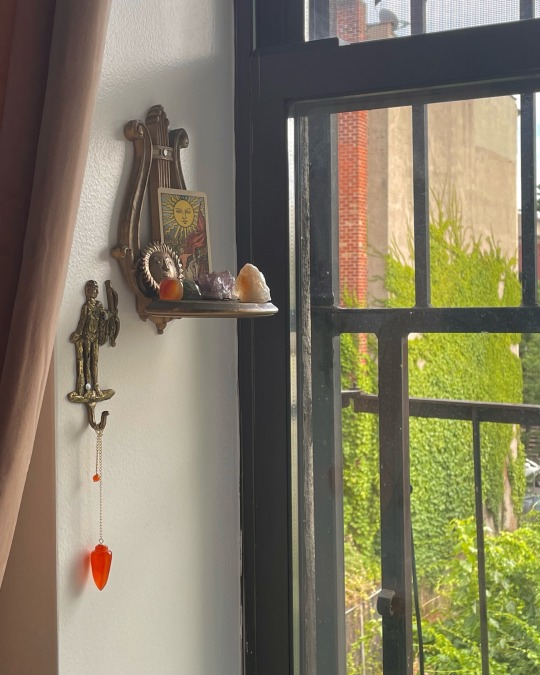
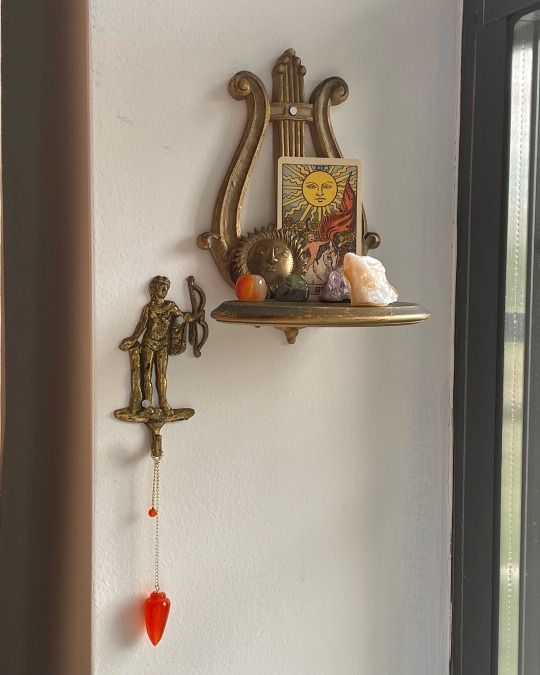
☉ apollo’s windowsill altar is slowly coming together ☉
1K notes
·
View notes
Text
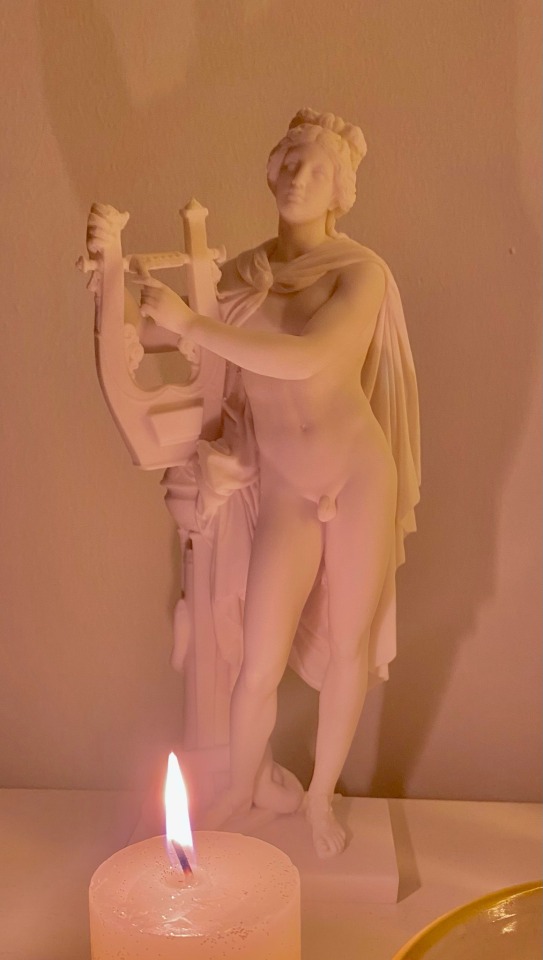
I will remember, nor could I forget, far-shooting Apollo,
whom gods tremble before as in Zeus’s abode he is striding—
then as he comes up close to the place they are sitting, they leap up,
all of them, out of their seats, as he stretches his glittering bow back.
393 notes
·
View notes
Text

Overly Sarcastic Production's Apollo, the god of prophecy.
And the dodgeball he throws at random internet users.
29K notes
·
View notes
Text
O Apollo, most luminous lord of the arts, leader of the honey-voiced Muses, I sing of you; I pray, with melodies unmatched, give onto me your divine inspiration, and bestow upon me gentle song in both voice and lyre so I may return your most wonderous gift in hymns of praise.
103 notes
·
View notes
Text
☀️ Apollo devotional acts ☀️
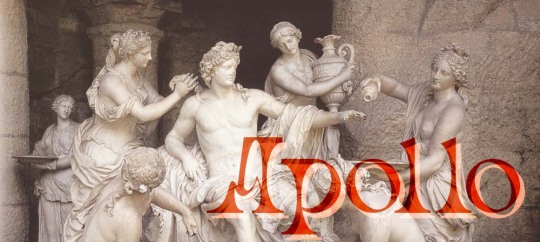
Hello it's me again with a post I was meant to put online three weeks ago! I've done several of these: Artemis - Demeter - I also made one for Hermes during my 30 days challenge but I've just realized it's quite short so I will be making a new one again at some point in the future.

What are devotional acts?
Devotional acts, or devotional activities/practices are things one can do in order to honor a deity, just like one would do with physical offerings or prayer. In short, instead of giving, say, wine, you will offer time and energy (the mundane one). You would typically look at a deity's domains and pick some things related to them.
So here is a list of things you might do, in the hope that it would spark some ideas. Of course the list in non-exhaustive !

☀️ Study academic fields (sciences or humanities) - dedicating your studies to him can be one of the easiest devotional act you can do. Can be for school/uni/work or simply your research related to the hellenic path. He’s all about the pursuit of knowledge so no matter the field, you can dedicate this time to him. It's a side of him that is a bit forgotten as people will think of Athena first, but it is completely in line with his domains as a god of Knowledge and Education.
☀️ Art and Music making and appreciation - he is the god of music and all the fine arts so you can dedicate the practice of these things to him and call upon his aid to develop your skills and sensibilities. The mastery of Arts requires the combination of technical skills, emotional sensibility, the capacity to break down things mentally, and the creativity to bring out solutions, things that are his domains as a god of Reason and Expression. If you don’t make art, you can simply dedicate some time to your appreciation of those fields by going to an exhibition or a concert.
☀️ Honoring the Muses - his epithet Musagetes means leader of the muses and is meant to connect him to the Arts, as previously mentioned. However, you could also take that more litteraly and devote your time forming a relationship with the Muses to him.
☀️ Write and appreciate poetry - made this a separate entry for how important this was to the Ancients. Without judging yourself, write your thoughts and feelings freely and see it as an expression of your mind and soul. Alternatively, lose yourself into the writings of others.
☀️ Working around health - Apollo is the god who inflicts but also relieves plagues, and the father of Asclepios. He is thus linked to the medical field and any practice related to that would be a great idea. One of his epithets, Acestor, means healer.
☀️ Philosophy - Apollo is the patron of those who seek truth and wisdom, so not only would studying philosophies and religions be a neat idea, the most important would be to adopt that mindset and make sure you reflect on your values, the meaning of your life, your place in society, etc… The delphic maxims can be a good place to start, not to use them as dogmas but rather to stimulate your own thoughts and spark questions. When I think of Apollo I think of a god who wants us to keep questioning the world and ourself and push us to a better understanding of things and to build our own sense of ethics.
☀️ Introspection - As an extension of that, practising a form of introspection as a way to shed light on the most unknown parts of yourself and seeking understanding of your whole self. Keep an journal to write down your introspection sessions can be a great devotional act and would draw his good influence upon you.
☀️ Pursue the best version of yourself (with kindness) - to some extent all gods want to see you become the best version of yourself, but I don’t know why, maybe it’s a bit of an UPG, but I see Apollo as the one who thrives for perfection the most and works hard for that. Just be careful that this doesn’t become unhealthy and that you are always doing this with kindness and love for yourself.
☀️ Celebrate the blessings the light and the warmth of the sun gives us - he isn’t the Sun himself (that is Helios) but he is undeniably linked to the Sun and its light so he is the one I go to when I want to celebrate the bright season and its blessings. Personally I intend to celebrate the summer solstice with him.
☀️ Practice methods of divination - he is the god of prophecy and oracles and one you can go to to improve your ability to divine. He isn’t the only god whose domain is of one form of divination (Hermes has ornithomancy and astragyromancy, and Zeus had oracles), but he was the one who spoke through the Pythia so you can dedicate the development of your psychic senses to him. Also, Tarot is a relatively modern invention but I link it to him due to the fact that it’s an elaborated system through which spontaneous insight arises.
☀️ Teaching - giving a drawing or music class, or just anything really. The idea of transferring your knowledge and allowing someone else to become more skilled at something. Especially great with the youth since Apollo is one of its protectors.
☀️ Crafting things for your altar - maybe you want to make a laurel wreath (his sacred plant) to DIY your altar, or what about a scented candle containing solar plants, you could also use clay to shape little elements that you will paint later as a decoration. The possibilities are endless!
☀️ Note on donations: an alternative to practising the activities I previously mentioned, you could also give your money to those causes and domains. For example: by supporting local artists or health-workers.
446 notes
·
View notes
Text
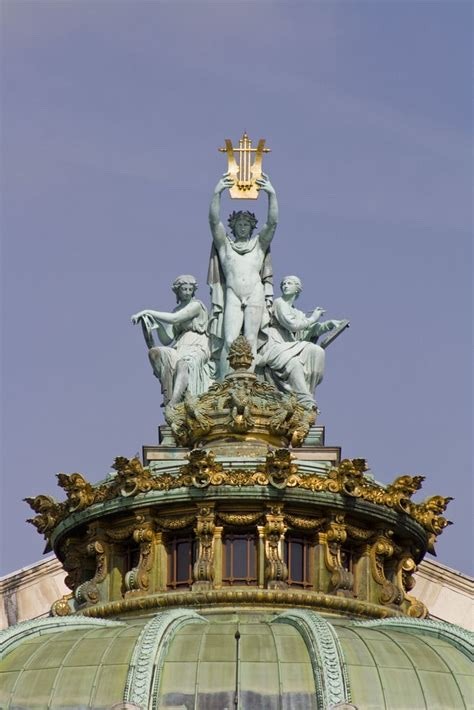
Here’s a photo of the ‘Apollo statue’ (joined by Harmony and Poetry) on top of the Paris Opera.
While it’s a beautiful homage to him as the God of the arts, what I also find really cool is that here the lyre he’s holding is actually a lightning rod!
While I understand that its got its own technical functions, I’m annoying and it got me thinking about something…
Apollon was the one who was said to share the will of Zeus with mortals through his prophetic functions. And what is will if not an outward expression of the self? A form of power?
One of the ways Zeus manifested his will was through the medium of prophecy via words which we directly understood as certain commands or knowledge pertaining to what Zeus believed should happen.
Another way Zeus expressed his will was through more overt displays of manifestation— like lightning, a medium which he was also able to perfectly wield according to his will.
So… it’s pretty cool how poetry and prophetic functions were so often linked together. And how Apollon presided over both domains. And how with this specific statue, Apollon is quite literally relaying a manifestation of Zeus’ will to our realm, not through prophecy, but by using the tool of poetry / music to do so.
And there are so many directions I can go with this!! Watch me write an entire unmarked and unasked for essay lol 😌😌
451 notes
·
View notes
Text
here is your daily reminder;
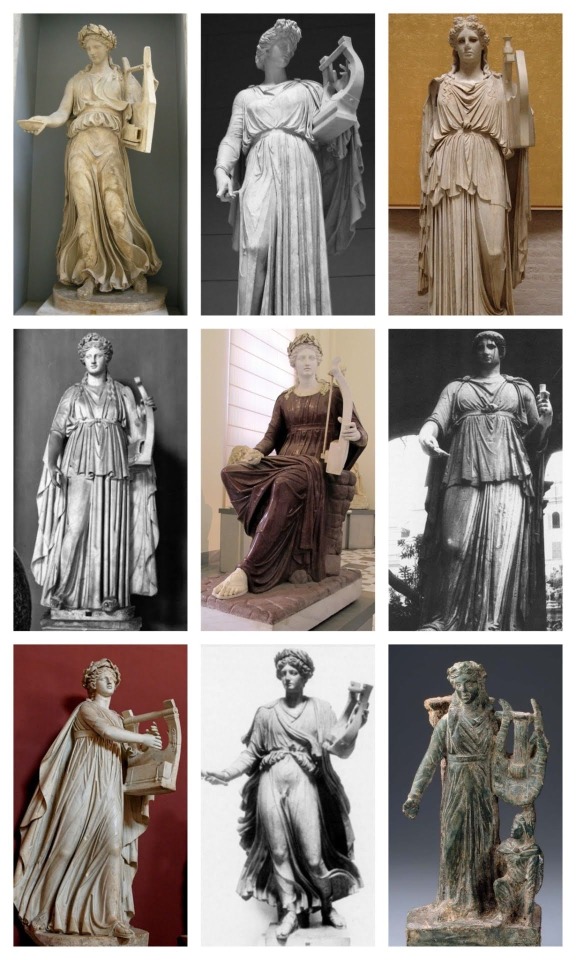
Apollo, historically, wore dresses!! (or rather, the ancient greece equivalent to a dress today)
949 notes
·
View notes
Text
Relief to the Heart

Apollo, Relief to the Heart, Protector
Glory is upon You, crowned in flowers
Light of the Heavens, my Lord
I crack my chest open
And offer You my love
I received the inspiration for this piece during prayer. Here's my Twitter and my Instagram. Follow if you please🌻
271 notes
·
View notes
Photo
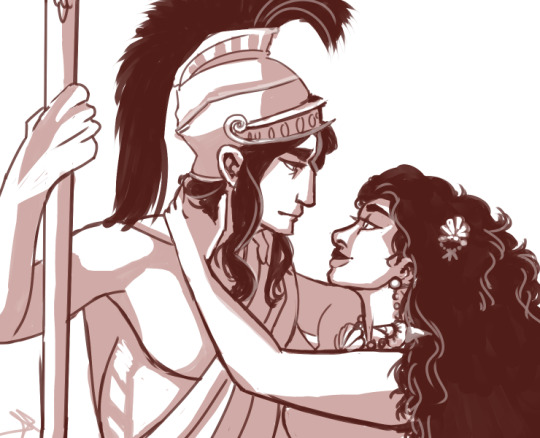
all’s fair in love and war and procrastination from study with aphrodite and ares
594 notes
·
View notes
Photo

Apollo. detail from a 2nd.century BC. funerary marble relief slab.
Archaeological Museum of Piraeus.
http://hadrian6.tumblr.com
653 notes
·
View notes
Text
I really hate to do this, but my family and I are in desparate need of some help.
I go into more detail in this post but basically my family has been going through a really rough time lately.
My partner and I live in the same house with my dad. We are both neurodivergent and find it incredibly difficult holding down a traditional job but we try our best. I also have PCOS, anxiety and get frequent panic attacks. I'm mostly unmedicated since I don't have insurance and the health department I go to doesn't like to perscribe anxiety meds.
My dad owns the house we live in and has been paying the majority of the bills, with us helping wherever we can. But he recently had a heart attack and has been slow to reccover from it. He now has an issue with his heart where it is either beating slower than it should be or it's missing beats causing him to get dizzy. He's even passed out a couple of times.
The doctor is sending him a heart monitor to wear for awhile so that they can determine what is actually going on, and the best way to proceed. But in the meantime he has been tiring really easily and finds it hard to do his job. He's missed a lot of work due to debilitating dizzyness.
We already knew we weren't going to have any kind of Christmas celebration but now we may not even be able to pay our bills. Our phones are still on til the end of the month but we lose our internet tomorrow.
The electric bill is $200.00, it's coming up soon and we aren't sure we will be able to pay it. Not to mention the house payment, car insurance, house insurance, my dad's health insurance (which he desperately needs right now), and more. Then of course there's our own bills to worry about.
If you could help us by sharing this post or donating, we would really, really appreciate it. ♡♡♡
Paypal: @reachingforroses
Venmo: @Reaching_For_Roses
Cashapp: $1ReachingForRoses1
110 notes
·
View notes
